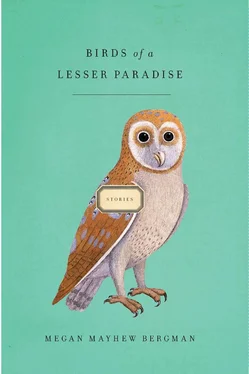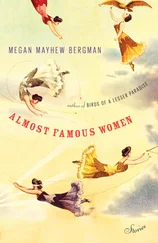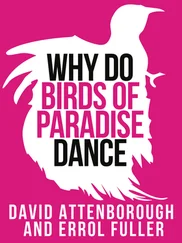But when I lay in bed at night I saw the deep abscesses on the chests of the sheep, dragging themselves to food and water across a rock-strewn lawn. The scared eyes of the feral cats underneath the sofa. I felt the warm bodies of the retrievers next to me, the kind of limitless love other people dreamed of and I had — all to myself.
Procter and Gamble arrived in the backseat of Emory’s jeep, freshly castrated.
At first we could not coax them from the car. I pulled dog treats from my jean pockets and offered them in my hand. They stared at me with slivered eyes and split lips. Both sheep were chestnut brown with black spots.
Grazers, Emory said. Probably not interested in faux bacon.
For a minute I thought it best if they stayed in Emory’s car, cowering in the backseat. It might save me from what I was about to do.
You’re going to keep these guys in the dog run out back? Emory asked.
Sure, I said.
Emory and I pushed and pulled the sheep into the backyard.
Two things you’ve got to do, she said after we’d gotten them into the pen. First, you’ve got to deworm these babies. You put the pill in the back of the throat like this.
Emory deftly pried Gamble’s mouth open and shoved the pill in.
You want to bypass their first stomach and get the pill directly into their second stomach, she said.
Fine, I said.
I wanted to act as if I were not intimidated, as if this were not the first time I was learning of multiple-stomach scenarios, of pilling sheep.
Second, she said, you’ll need to trim their hooves regularly. With what? I asked.
Trimming shears, she said. Hold the foot by the ankle in your left hand, the shears in the right.
Emory flipped Gamble upside down to demonstrate. His stomach was the color of oatmeal.
Good ram, I said.
A castrated male is a wether, Emory said. Gamble hasn’t been a ram in a week, have you, Gamble?
His body was rigid, inflexible. He did not respond to her voice.
These guys will take your yard in two days, Emory said. Then they go bipedal on you, standing on their back hooves and eating the leaves off your trees. I’d recommend getting some hay. You don’t have a neighborhood association, do you? she asked.
Not one with any bite, I said.
As the sun went down I found myself afraid to leave the sheep untended in the backyard. They huddled together in the dog run. I peeked at them through the blinds every ten minutes.
That night, while I was watching Mr. Ed reruns, the raccoon crept onto the back of the couch and grabbed my necklace, snapping my head backward.
Rodent! I said.
Later, I found the retrievers licking plates in the open dishwasher.
Get! I said. Get out!
I was embarrassed by the desperate, angry sound of my voice. Sam lowered his head, then raised his large brown eyes.
We are just being dogs, he seemed to say.
One of the feral cats brought a rubber band to my chest during the night. A gift I consciously mistook as gratitude.
Gray and I had a tradition when it came to rashes. We named them after members of the Jackson Five. Gray once had a patch of poison ivy named Tito. I had ringworm named Jermaine.
A new ringworm had appeared on my elbow. The doctor said I had gotten it from Procter and Gamble. Emory said I had washed them too much, removed natural lanolin that protects them from the worm.
I broke with convention and named it La Toya.
I thought of the pristine sheep in my mother’s Christmas village, their white coats like fine cashmere, led down cobblestone streets by fungus-free children.
Gray and I had started home-improvement projects before he left, painting the front door pale blue, planting bulbs, laying sod. It had taken Procter and Gamble a day and a half to work over the back lawn after I’d let them out of the dog run and into the fenced yard for a change of scenery. We’d planted a melon patch in the side yard that was beginning to come up. I figured the sheep would get that, too, given time.
In my mother’s Christmas village there was a cottage garden overgrown with ivy and wisteria. A woman with golden ringlets sat on the stone steps, a baby in one arm, a cup of tea beside her.
Live like this .
Even at two in the morning, my house felt alive. I could hear the raccoon chittering at the cats, Sam dreaming, the chinchilla knocking his head against his water dish. Salli had taken Gray’s spot in the bed, her legs outstretched, head on the pillow.
I was outnumbered, outmaneuvered. There was no one to do the dirty work for me. The dirty work wasn’t lifting hair balls from the living room carpet. It wasn’t mashing Sam’s dog food with water and fish oil tablets. It was discipline.
I did two strange things that week. I began sleeping with Gray’s flannel shirt underneath my pillow. Then I took a volume of his leaf collection — the one with the pressed, waxy leaves of the mountain camellia — and hid it in the drawer of my bedside table.
When he came back for the remainder of his things, these I would keep.
Gray called me at home the following week to see if I’d had a change of heart. Have you thought about us? Gray asked. Are you ready to make some adjustments? Ditch the chinchilla?
I’d love to have you here, I said. But you know I can’t get rid of the animals.
I’m not asking you to get rid of all of them, he said.
You know I can’t, I said. Not any.
I’m looking at a job in Texas.
I understand, I said.
You could go with me, he said.
I couldn’t.
I’ll call before I leave, he said, and hung up the phone.
For my birthday Gray had given me an antique display case lined in white canvas that held a mounted Amazonian parrot wing, emerald green with flecks of blue and yellow. Pinned below was the skin of a small marsupial, then two leaves that looked like lace.
It’s beautiful, I told him, lying. He beamed. I knew it was an expensive gift, something he thought represented the convergence of our interests. Something we might pass down to our children.
A conversation piece, he said.
I was too embarrassed to display it, worried Emory would see the remnants of animals pinned like trophies behind glass when she came to the house.
That night I took it out of the china cabinet and opened the glass lid. I stroked the soft wing and marsupial pelt, then touched the leaves. They crumbled like dust.
Recipes began appearing in my mailbox, compliments of neighbors. Braised lamb shanks with rice. Curried lamb stew. Lamb kebabs. Tandoori-spiced leg of lamb.
You should move farther out, Emory advised. Get into the country.
For an animal activist, moving to the country meant moving across the line from hobby rescue to sanctuary. I was not ready for that.
I’m happy where I am, I said.
How are the sheep? Emory asked.
Sheeplike, I said.
Procter and Gamble reminded me of garden gnomes, frozen when I was outside yet surprisingly destructive when unwatched. They stiffened when the retrievers sniffed their tails, flattened their ears like Yoda.
Remember, Emory said. Dogs have double lives. They can kill the sheep when you’re not looking.
One of my dogs has no teeth, I said. One is bound to a cart. The other has one ear and fear issues.
Over fifty percent of sheep attacks are launched by domestic dogs, Emory said.
There are other things I’m losing sleep over, I said.
To Emory, all living things were in danger. It made her feel like a hero.
I spent the afternoon laying stones for the sheep, hoping the friction would help wear their hooves down. The spring sun was warm. I drank lemonade and vodka and let the dogs loose in the backyard.
Sam found a rabbit in the ivy patch. He gummed the rabbit by the neck, brought him to me.
Читать дальше












